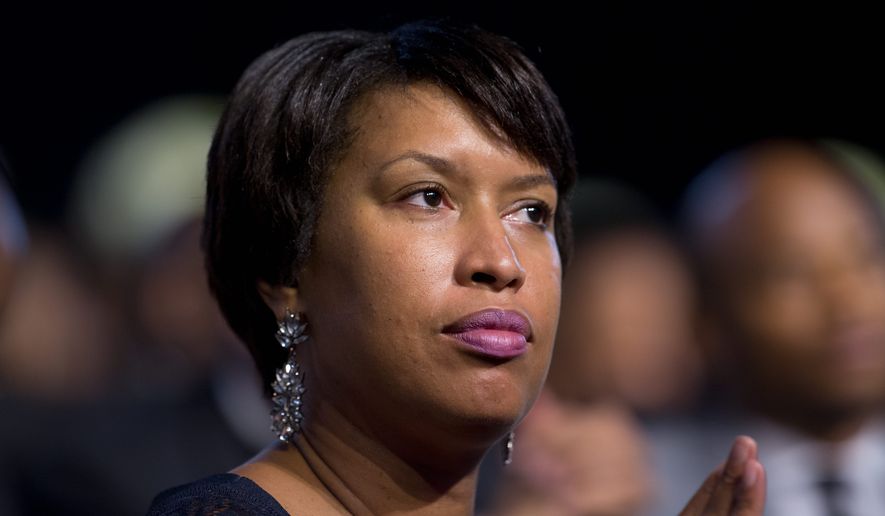Public opinion is split on a bill crafted by D.C. Mayor Muriel Bowser that would raise the minimum wage to $15 an hour by 2020 and the tipped wage to $7.50 by 2022.
Low-wage workers trying to support a family say the extra pay could help lift them out of the cycle of poverty, while some restaurant and small-businesses owners say the pay bump to tipped workers would be an undue burden.
“I make less than $15 an hour, so I can’t always eat enough food or buy new clothes for me and my son,” Ward 5 resident Syid Adbullah, a janitor who cleans downtown offices, said Thursday at a D.C. Council public hearing. “I’m 61 years old, but I’m relying now on my 14-year-old to get a summer job to help me out — $15 per hour would help me make some of my ends meet.”
But a slew of local restaurant owners took issue with the provision that would raise the tipped minimum wage, saying their employees already make well above the minimum wage and that some earn more than managers and salaried staff. About 100,000 tipped workers are employed in the District.
Diane Gross, who owns Cork Wine Bar in the U Street neighborhood, said tripling the tipped minimum wage would hurt her servers and cripple her business since it’s already difficult to make a living running a restaurant.
“It’s a tough balance every single day,” she said. “The current system works well for tipped employees. We are mom and pop shops operating with regular clientele. As costs go up, we absorb it.”
SEE ALSO: D.C. area Memorial Day traffic to be worst in decade, AAA says
Last month, Ms. Bowser proposed to raise the minimum wage for D.C. workers to $15 an hour by 2020. The current wage minimum is $10.50 an hour and is set to rise to $11.50 on June 1.
The Democratic mayor also has proposed raising the minimum wage for tipped workers from $2.77 to $7.50 an hour by 2022. Thursday’s hearing before the council’s Business, Consumer and Regulatory Affairs Committee, was the first time the public got to speak about Ms. Bowser’s proposal.
Stories like Mr. Adbullah’s abounded at the hearing, which saw more than 150 workers, pay advocates, restaurant owners and community members share their thoughts about raising the minimum wage.
Several worker advocacy groups made it known that they support the higher minimum wage. About 114,000 working people in the District would be affected by raising the minimum wage to $15, according to Economic Policy Institute. That’s 14 percent of the city’s workforce.
Ilana Boivie, a senior policy analyst for the DC Fiscal Policy Institute said research shows there has been no significant impact on job growth or employment opportunities when the minimum wage is increased. And that a higher minimum wage leads to less employee turnover and workers who are more enthusiastic about their jobs.
Jaime Contreras, vice president of the local Service Employees International Union, said raising the minimum wage would give the security officers, janitors and building service workers he represents an opportunity to become financially stable again.
“For low-wage workers, an increase in the minimum wage to $15 does not mean luxury; but it will mean a stride forward on the path towards earning a family sustaining income,” Mr. Contreras said. “Opponents of this bill will say that raising the minimum wage will cost too much. But we know that it is poverty level wages that cost too much.”
Much of the opposition came from small businesses who said raising the tipped minimum wage is a bad idea.
Kathy Hollinger, head of the Restaurant Association Metropolitan Washington, said the bill would actually hurt tipped workers even though it’s meant to help them.
“What tends to get lost in these debates is that we want the same thing, an economy that works in D.C. We all want these businesses to be a source of pride, great places to eat and great places to work,” she said. “Bartenders and servers in D.C. make on average $40 an hour. Why are we trying to fix something that doesn’t need to be fixed?”
Ms. Hollinger said it also would cause restaurants to re-evaluate their workforce as well as the prices on their menus, “because money has to come from somewhere.”
David Moran, managing director for The Hamilton and Old Ebbitt Grill, said increasing the tipped wage would be disastrous for local restaurants. He said the restaurant industry has brought economic prosperity to many District neighborhoods.
“The legislation threatens this very economic engine,” Mr. Moran said.
Still, council member Charles Allen slammed restaurant owners for opposing a higher tipped wage.
“Our tipped minimum wage is not even equal to that of our neighbors,” said Mr. Allen, Ward 6 Democrat. “Even those progressive bastions of North Dakota and South Dakota have higher tipped minimum wages than we do.”
Last month, New York and California increased their hourly minimums to $15 by 2020 and 2022, respectively.
Meanwhile, officials in Montgomery County, Maryland, are preparing similar legislation in concert with the District. Seattle and San Francisco in 2014 became the first U.S. cities to increase the minimum wage to $15 an hour by 2020.
• Ryan M. McDermott can be reached at rmcdermott@washingtontimes.com.




Please read our comment policy before commenting.